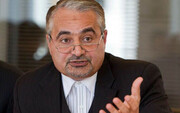Abolghasem Bayyenat of Harvard University and Hossein Mousavian of Princeton University wrote in an article titled How to Make the Iranian Nuclear Deal Durable in the US-based National Interest, “The fate of the Joint Comprehensive Plan of Action (JCPOA), or what is more commonly known as the Iran nuclear deal, is hanging by a thread. As diplomats are jockeying to find a way to revive the nuclear agreement, the bigger question hanging on policymakers' heads is how to prevent a revived JCPOA or any other similar deal with Iran from suffering the same fate under President Joe Biden or his successors and ensure its durability. Reaching a grand bargain with Tehran and involving the US Congress in the adoption of the nuclear deal appear as two potential solutions, but they are not practical and realistic.”
“Rather, what can save the Iran nuclear deal, in the long run, is resetting the Iran-U.S. relationship and establishing a modus vivendi between the two countries.”
They added, “The record of the JCPOA’s enforcement over the past five years demonstrates that the main threat to any nuclear agreement with Tehran emanates in large part from Washington’s desire to preserve most of its economic leverage over Iran and minimize the actual benefits of sanctions removal for the country.”
“This is basically because the core dispute between the United States and Iran is about the region, not just the nuclear issue. Trump’s withdrawal from the JCPOA in May 2018 and the reimposition of unprecedented US sanctions against Iran clearly bear out this assessment, as they were meant to regain and expand the US bargaining power against Iran in the hope of securing a better nuclear deal and addressing the regional issues.”
Saying that the fear of US defection along with security motivations also incentivizes Tehran to refrain from undertaking irreversible commitments and to preserve a significant portion of its nuclear capabilities as leverage, the two researchers went on to write that the commitments' reversibility between the United States and Iran are asymmetrical because it is relatively easy for Washington to snap back its sanctions but it is technically an arduous and lengthy process for Tehran.
“The experience of the US withdrawal from the JCPOA has only validated these fears for Tehran and exacerbated the atmosphere of mutual mistrust between the two countries.”
The two academics added, “Overcoming this dilemma would not be possible without departing from the current zero-sum mentality plaguing the Iran-US relationship. Both Washington and Tehran need to recognize that their intractable conflict over the past four decades has produced no clear winner and has only brought about lose-lose outcomes for them.”
"The United States and Iran should aim for reaching a modus vivendi keeping their political conflict within manageable limits. However, it would not be possible to minimize animosity without anchoring U.S. strategy in a more realistic assessment of Iran’s capabilities and intentions in the region and divorcing it from exaggerated and alarmist views."
They went on to say that a realistic US strategy should be guided by the fact that Iran is one of several in the Middle East and that its military expenditures are far below those of the second and third-tier powers in the region and added, "Iran's quest for its natural and legitimate regional role should not blind one to the fact that in nearly all its regional interventions, Iran has operated in countries such as Syria and Iraq to save allies from collapse rather than embarking upon imperial expansion. Similarly, one should not lose sight of the fact that Iran's military involvement in the region pales in comparison to those of Saudi Arabia, Turkey, and Israel both in terms of form and magnitude."
Reaching a modus vivendi would not be easy and cannot be achieved overnight by two governments that have engaged in constant demonization of each other over the past four decades, they wrote, adding that however, with a sustained exchange of confidence-building measures and goodwill gestures, including toning down their inflammatory and accusatory rhetoric, the two governments can manage a process of gradual de-escalation.
Reviving the nuclear deal and implementing it in good faith can work as a starting point for them, followed by economic cooperation in the framework of JCPOA, they said.
"Boeing and the Iranian civil aviation organization’s deal to sell 80 commercial airplanes to Iran in the final months of Obama’s tenure serves as proof that such economic engagement is possible. Dozens of similar business deals may be struck once Iran is able to engage in normal international trade and establish unrestricted banking relations with the rest of the world."
Saying that solving the regional issue between Tehran and Washington is difficult because they need a higher level of mutual trust, they wrote, “A regional security and cooperation mechanism could unleash regional efforts to tackle deep-rooted challenges such as energy security, shared environmental problems, maritime security, organized crime, drug trafficking, and regional stability."
In the end, they reminded that "failing to come to such a minimum level of peaceful coexistence between Iran and the United States would perpetuate existing tensions and insecurity in the region and put the two countries and the region on the likely path to military confrontation, which will victimize nuclear nonproliferation.
"In the absence of a modus vivendi, it would be only a matter of time before a revived JCPOA unravels again and the parties head toward another round of dangerous mutual escalation in the illusory hope of building leverage and extracting more concessions from each other.”
9417**2050
Follow us on Twitter @IrnaEnglish





Your Comment